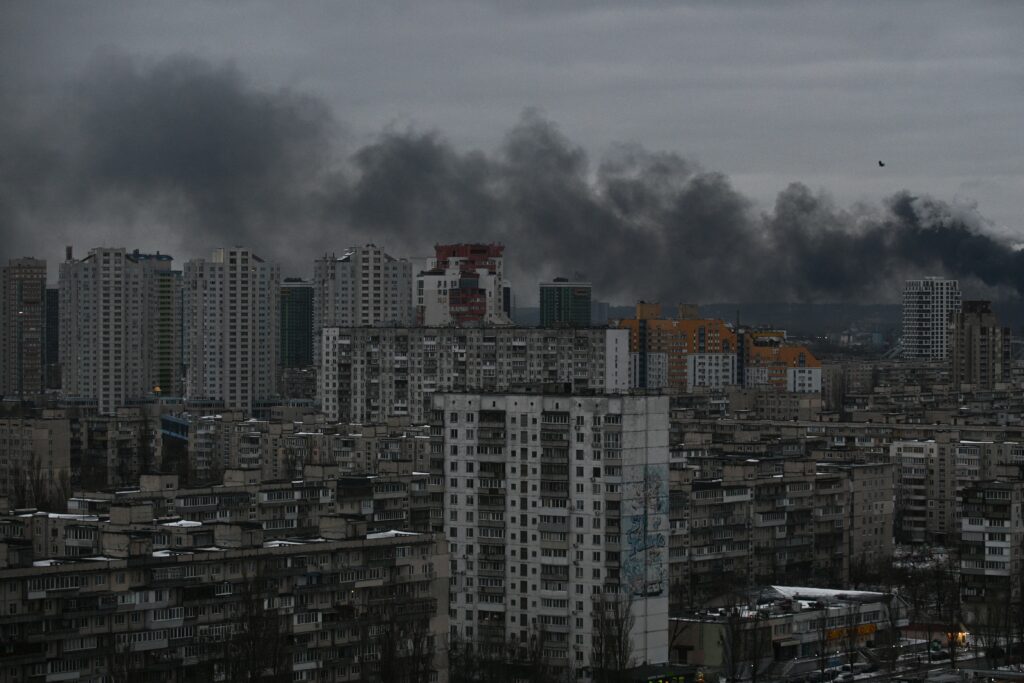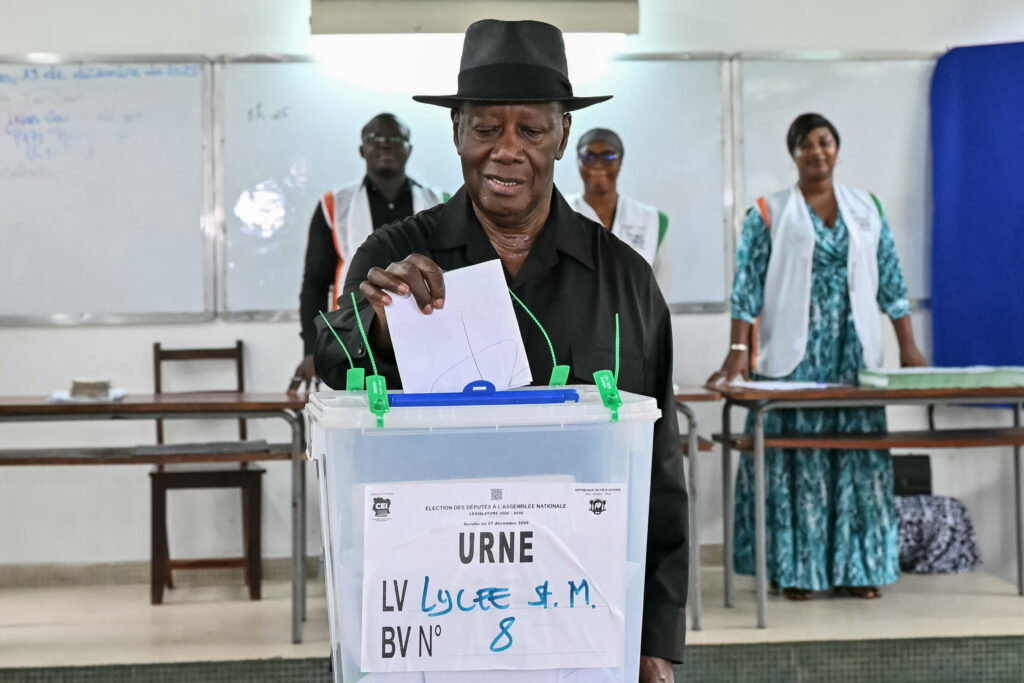Osimhen and Mane score as Nigeria win to qualify, Senegal drawSat, 27 Dec 2025 22:41:41 GMT
Star strikers Victor Osimhen and Sadio Mane scored on Saturday as Nigeria qualified for the knockout stage of the Africa Cup of Nations in Morocco, and Senegal edged closer to joining them.Osimhen opened the scoring for the Super Eagles just before half-time, and they built a three-goal lead before surviving a late Tunisia rally to …
Zelensky talks with allies en route to US as Russia pummels Ukraine
Ukraine’s President Volodymyr Zelensky consulted with allies on Saturday and won renewed expressions of support ahead of a meeting with US President Donald Trump, hours after Russia pummelled Kyiv with drones and missiles in its latest attack on the capital.During a stopover in Canada en route to Florida for the Trump meeting, the Ukrainian president spoke first with Canadian Prime Minister Mark Carney.Then, in a conference call, he briefed EU, NATO and European leaders, who gave him their “full support” according to German Chancellor Friedrich Merz.EU chief Ursula von der Leyen said in a social media post they welcomed “a just and lasting peace that preserves Ukraine’s sovereignty and territorial integrity”.Zelensky said the Russian onslaught showed Moscow had no intention of ending the invasion it launched in February 2022 and which has killed tens of thousands of people.”This attack is again, Russia’s answer on our peace efforts. And this really showed that Putin doesn’t want peace, and we want peace,” Zelensky said before meeting the Canadian premier.Carney said the latest Russian attack underscored the need to stand by Ukraine.”We have the conditions… of a just and lasting peace, but that requires a willing Russia, and the barbarism that we saw overnight… shows just how important it is that we stand with Ukraine,” said Carney.Russia has accused Ukraine and its European backers of trying to “torpedo” a previous US-brokered plan to stop the fighting.Adding to pressure on the battlefield, Russia announced on Saturday it had captured two more towns in eastern Ukraine, Myrnograd and Guliaipole.”If the authorities in Kyiv don’t want to settle this business peacefully, we’ll resolve all the problems before us by military means,” Russian President Vladimir Putin said Saturday.- ‘They do not want to end the war’ -The overnight barrage of drones and missiles, which targeted Kyiv for about 10 hours, killed two people, wounded dozens and cut power and heating to more than a million of the region’s residents during freezing temperatures, Ukraine authorities said.Zelensky said some 500 drones and 40 missiles had pounded the capital and its surrounding region.”Russian representatives engage in lengthy talks, but in reality, Kinzhals (missiles) and Shaheds (drones) speak for them,” he said.”They do not want to end the war and seek to use every opportunity to cause Ukraine even greater suffering,” he added. Neighbouring Poland, a NATO member, scrambled jets and put air defences on alert during the attack, its military said on social media.- ‘Security guarantees should be strong’ -Sunday’s meeting in Florida is to focus on a new, 20-point plan that would freeze the war on its current front line. It could require Ukraine to pull back troops from the east, allowing the creation of demilitarised buffer zones, according to details revealed by Zelensky this week.The new plan, formulated with Ukraine’s input, is Kyiv’s most explicit acknowledgement yet of possible territorial concessions.It is a marked departure from an initial 28-point proposal by Washington last month that adhered to many of Russia’s core demands.Trump, speaking to news outlet Politico on Friday, said of Zelensky’s plan that “he doesn’t have anything until I approve it”. He added: “So we’ll see what he’s got.” Part of the plan includes separate US-Ukraine bilateral agreements on security guarantees, reconstruction and the economy.Zelensky said those were changing daily. “As for sensitive issues, we will discuss (the eastern region of) Donbas and the Zaporizhzhia nuclear power plant,” he added.Zelensky said his meeting with the US leader was aimed at reducing unresolved issues to a minimum.”Of course, today there are red lines for Ukraine and Ukrainian people. There are compromise proposals. All of these issues are very sensitive,” he said on X.Meanwhile, Ukraine needed European and US support to acquire weapons and funds, both of which were insufficient, Zelensky said — “in particular for the production of weapons and, most importantly, drones”.In negotiations, Ukraine’s “most important consideration — if we take certain steps — is that security guarantees should be strong and we should be protected”, he said.Ukraine is working with the US on a roadmap for the country’s reconstruction, said Zelensky, which will require between $700 billion and $800 billion.
CAN-2025: le Nigeria en huitièmes après sa victoire sur la Tunisie
Le Nigeria, porté par Ademola Lookman, s’est qualifié pour les huitièmes de finale de la Coupe d’Afrique des nations au Maroc grâce à sa victoire 3-2 sur la Tunisie samedi à Fès.Après l’Égypte vendredi, les Super Eagles, assurés de terminer premiers du groupe C, sont la deuxième équipe à rallier la phase finale qu’ils débuteront le 5 janvier face à un troisième de groupe, à Fès également.Placé un cran derrière la star Victor Osimhen et le Sévillan Akor Adams, Lookman a été l’homme du premier match vraiment spectaculaire de la CAN marocaine en offrant deux passes décisives sur les deux premiers buts nigérians et en se chargeant d’aggraver lui-même la marque pour le 3-0. Sa première passe, l’attaquant de Bergame l’a adressée à Osimhen, l’attaquant masqué, qui de la tête a sanctionné en fin de première période la domination totale des siens tout au long du premier acte (1-0, 44e). L’ex-attaquant de Naples, désormais à Galatasaray, a toutefois écopé d’un carton jaune après son but pour avoir provoqué lors de sa célébration le banc tunisien. Comme tous ses partenaires, Osimhen a été intenable en première période durant laquelle il a pensé ouvrir le score dès la 18e minute en reprenant, en renard, un ballon repoussé par Aymen Dahmen après une frappe à ras-de-terre d’Adams. Mais son but a été refusé pour hors jeu.Dès le début de la seconde période, toujours aussi précis, Lookman, sur corner a trouvé cette fois la tête de son capitaine Semi Ajayi qui s’est élevé au-dessus de tout le monde pour doubler la mise et mettre le Nigeria à l’abri d’un retour de la Tunisie (2-0, 49e). -Lookman, deux passes, un but-Trouvé en retrait par Osimhen qu’il avait parfaitement lancé, Lookman s’est avancé dans la surface avant de tirer au ras du poteau gauche tunisien pour le 3-0 (67e).Dépassée par l’intensité physique mise par les Super Eagles, la Tunisie a poussé en fin de rencontre et réduit le score grâce à un coup franc d’Hannibal Mejbri, le pendant tunisien de Lookman, repris de la tête par Montassar Talbi (3-1, 74e), et un pénalty transformé par le Nicois Ali Abdi après une main de Bright Osayi-Samuel, sanctionnée par la VAR (3-2, 86e).Un réveil trop tardif pour contester la victoire du Nigeria, laborieux lors de son entrée en lice face à la Tanzanie (2-1), pas qualifié pour le Mondial-2026, mais finaliste de la dernière CAN et bien décidé à aller jusqu’au bout au Maroc. La Tunisie, dépassée mais combative, qui aurait même pu égaliser en fin de rencontre, devra battre la Tanzanie mardi à Rabat pour rejoindre le Nigeria en huitièmes de finale.
Zelensky soutenu par les Européens et le Canada avant sa rencontre avec Trump
Le président ukrainien Volodymyr Zelensky, qui a fait escale samedi dans la ville canadienne d’Halifax sur la route de la Floride, a reçu le soutien appuyé des Européens et du Canada à la veille d’une rencontre cruciale avec Donald Trump.Dans la nuit de vendredi à samedi, peu avant le voyage du président ukrainien, des frappes russes massives ont visé la capitale Kiev et sa région, faisant deux morts, une quarantaine de blessés et laissant plus d’un million de foyers sans électricité.Ces nouveaux bombardements montrent que la Russie “ne veut pas mettre fin à la guerre”, s’est emporté M. Zelensky.Plus tard, au cours d’une visioconférence entre le chef de l’Etat ukrainien et les principaux dirigeants européens, le président français Emmanuel Macron a de son côté souligné que ces attaques illustraient “le contraste entre la disposition de l’Ukraine à bâtir une paix et durable et la détermination de la Russie à prolonger la guerre qu’elle a déclenchée il y a près de quatre ans”.Les pays européens, le Canada, l’UE et l’Otan ont à cette occasion assuré M. Zelensky de “leur plein soutien” avant ses discussions prévues pour le lendemain avec le président américain, a déclaré le chancelier allemand Friedrich Merz.Ce dernier a affirmé que les efforts des Européens et du Canada en vue d'”une paix durable et juste en Ukraine” se feraient “en étroite coordination avec les États-Unis”.- L'”intégrité territoriale de l’Ukraine” -“Nous saluons tous les efforts qui mènent à notre objectif commun : une paix juste et durable qui préserve la souveraineté et l’intégrité territoriale de l’Ukraine”, a renchéri la présidente de la Commission européenne, Ursula von der Leyen.Le Premier ministre canadien Mark Carney a quant à lui insisté, en recevant M. Zelensky en Nouvelle-Ecosse, sur le fait que toute “paix juste et durable” en Ukraine ne pourrait être établie qu’avec “une Russie prête à coopérer”.”Nous devons mettre fin à cette guerre, et pour cela, nous avons besoin de deux choses : exercer une pression sur la Russie et apporter un soutien suffisamment fort à l’Ukraine”, a pour sa part plaidé le président ukrainien.Volodymyr Zelensky doit s’entretenir avec M. Trump à propos des “questions sensibles” que sont le sort du bassin minier du Donbass, dans l’est de l’Ukraine, et les garanties de sécurité occidentales pour Kiev, dans le cadre des négociations sur la plan américain destiné à mettre fin au conflit.Et ce après que, dans la nuit de vendredi à samedi, la capitale ukrainienne et ses environs ont été la cible d’au moins 519 drones et 40 missiles, dont respectivement 474 et 29 ont été neutralisés, selon l’armée de l’air. Ces frappes, comme les précédentes, ont visé des infrastructures énergétiques.Conséquence, a déploré la compagnie d’électricité DTEK, plus d’un million de foyers ont été privés de courant.Le ministère russe de la Défense a dans le même temps fait savoir que plus de 230 drones ukrainiens avaient été abattus samedi au-dessus de la Russie.L’armée russe, qui a accéléré ses avancées sur le front ces derniers mois, a par ailleurs revendiqué la prise de la ville de Myrnograd, dans l’oblast de Donetsk (est), et de celle de Gouliaïpolé, dans la région de Zaporijjia (sud).- “Je pense que ça se passera bien” -Volodymyr Zelensky et Donald Trump évoqueront en Floride le plan américain, présenté par Washington il y a près d’un mois. Le président ukrainien a dévoilé cette semaine la nouvelle mouture de ce document, retravaillé après d’âpres négociations avec Kiev.Cette nouvelle version propose un gel du front sur les positions actuelles sans offrir de solution immédiate face aux revendications territoriales de la Russie, qui contrôle environ 19% de l’Ukraine.Le nouveau document abandonne deux exigences clés du Kremlin : un retrait des troupes ukrainiennes de la région de Donetsk et un engagement de l’Ukraine juridiquement contraignant de non-adhésion à l’Otan.Dans ces conditions, la validation de cet accord par Moscou paraît improbable. Le vice-ministre russe des Affaires étrangères, Sergueï Riabkov, a ainsi accusé vendredi Kiev et ses alliés européens de vouloir “torpiller” les négociations et appelé à revenir aux ententes antérieures, faute de quoi “aucun accord ne pourra être conclu”.”Si les autorités de Kiev ne souhaitent pas régler cette affaire pacifiquement, nous résoudrons tous les problèmes qui se posent à nous par la voie militaire”, a quant à lui mis en garde Vladimir Poutine samedi.Volodymyr Zelensky “n’a rien tant que je ne donne pas mon accord”, avait de son côté averti la veille Donald Trump. “Je pense que ça se passera bien avec lui. Je pense que ça se passera bien avec (le chef de l’Etat russe Vladimir) Poutine”, avec lequel il prévoit de s’entretenir “bientôt”, avait-il lancé.
Osimhen stars as Nigeria survive Tunisia rally to reach second roundSat, 27 Dec 2025 22:12:45 GMT
Victor Osimhen starred as Nigeria became the second qualifiers for the Africa Cup of Nations knockout stage after Egypt by surviving a late Tunisia onslaught to win 3-2 in Fes on Saturday. The Super Eagles were cruising to victory when leading 3-0 through goals from Osimhen, captain Wilfred Ndidi and Ademola Lookman.But Tunisia refused to …
Ivory Coast president seeks parliament majority in electionSat, 27 Dec 2025 21:01:29 GMT
Voting ended Saturday in Ivory Coast’s parliamentary elections, a vote marked by poor turn-out in Abidjan following a boycott call by opposition parties and a few scuffles.The election comes two months after 83-year-old Alassane Ouattara won a presidential ballot that extended his 14-year rule.In the Yopougon and Plateau districts of the city, fewer than 100 …
Ivory Coast president seeks parliament majority in electionSat, 27 Dec 2025 21:01:29 GMT Read More »






